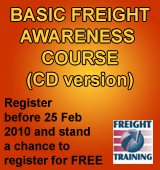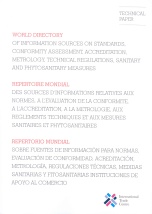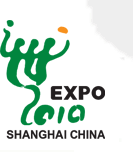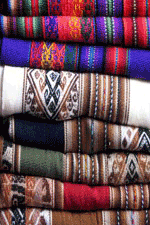|
Volume 3 | Number 1
|
|

Explore ExportHelp:

Interesting insights from the IMF |
| Below are several interesting articles of a more macro nature published in the IMF's recent quarterly magazine, Finance & Development (F&D), that I have selected for your interest. |
 |
Surviving the third wave - After the financial and economic crises, a "third wave" is engulfing the labor market, leaving millions without work and changing the course of their lives. F&D looks at the people likely to be hardest hit, and investigates how governments are responding.Click here to read more |
 |
Climate policy in hard times - Restoring economic growth after the global financial crisis need not thwart the fight against climate change. Carbon pricing can strengthen fiscal positions, and improved climate resilience can promote macroeconomic stability.Click here to read more |
 |
Technology, not talks will save the planet - Rather than trying to agree on elusive and ineffective carbon reduction targets, we should invest more heavily in new technology to fight climate change.Click here to download the article. |
 |
Rebalancing growth in Asia - With the increasing importance of Asian emerging markets in the world economy, rebalancing growth in developing Asia toward more reliance on domestic demand and less on exports is an important component of the global effort to stabilize the world economyClick here to download this article from the IMF. |
 |
Crisis contained - As Asia tentatively makes its way out of the global economic crisis, the region - and the world - watches and learns from its resilient, though far from invulnerable, journey. Five leading Asian voices share their views on the region's fragile rebound. Click here to read more. |

Our sister sites:






|
From the Editor
Dear Exporters
2010 is here and it's looking better already.
Well, I, for one, am very happy that 2009 is behind me. It wasn't a great year for me personally and I'm really looking forward to 2010. |
 |
I think this year is going to be a good year. Already it looks as though the recession is behind us (from a South African perspective) and the WTO’s expectations are that world trade will grow by more than 5% this year. That’s good news for all our exporters and in this issue we provide information about Argentina and Iran, and a host of export-related topics from around the world. We hope that you find this issue of value.
Please let us know if there is anything special that you would like us to cover in up-coming issues.
All the best for the year ahead.
Good luck
Neels Bothma
Editor |
|

Introducing Argentina
Argentina, officially the Argentine Republic, is the second largest country in South America, constituted as a federation of 23 provinces and an autonomous city, Buenos Aires. It is the eighth largest country in the world by land area and the largest among Spanish-speaking nations. If you are wanting to enter the South American market, Argentina might be a good place to start
Learn more about Argentina |
Fact of the Month |
| Some cod caught in Scottish waters are sent 10,000-miles round-trip to China for processing before being shipped back to the United Kingdom for sale in supermarkets and fast food outlets. (Source: globalEDGE) |
|
Food exporters urged to document health benefits

An increasing number of companies are coming under US Food & Drug Administration (FDA) scrutiny for poorly documented health benefit claims.
US-based Functional Ingredients magazine warns that businesses should rigorously document health benefits when introducing new products based on the next 'hero ingredient' or newly discovered substance prior to exporting. (Source: NZTE) Click here to learn more.
|
|
|
|
Doing business in ... Iran |
|
| Although there are many western countries that prohibit or limit trade with Iran, this is not the case with South Africa. Iran is South Africa’s 54th most important export destination and South Africa exported R1.28 billion to Iran in 2008 (more than to Argentina, Philippines, New Zealand, the Czech Republic or Hungary). At the same time, South Africa imported a massive R27.1 billion from Iran, making Iran South Africa’s 6th most important supplier! Clearly, most of these imports are oil. Nevertheless, these facts should encourage exporters to look at Iran more closely as an export destination. We have highlighted some articles for you on doing business with Iran.
See also: Country overview –www.countryhelp.co.za
|
|
Administration of Russian GSP System in SA transferred to SARS
Exporters and their agents should note that the authorisation of Certificates of Origin (Form A) under the Generalised System of Preferences (GSP) of Russia has been transferred from the dti to the South African Revenue Services (Customs) as from 1 December 2009. Click here to read more. |
|
|
The Australians are interested in doing business with us! |
|

Austrade's Business Club Australia (BCA) capitalises on unique business opportunities presented by truly global sporting events around the world. Not surprisingly, BCA have identified the 2010 World Cup in South Africa as one such event. BCA South Africa 2010 was consequently launched in Cape Town by the Australian High Commissioner to South Africa, HE Ann Harrap. The program will provide a variety of networking and client hosting opportunities surrounding the June 11 - July 11 2010 Tournament in South Africa. Clearly, Australia is more interested in selling to us than buying from us, but as an exporter I would definitely look into this opportunity to make contact with Australian businesses. Click here to read more.
|
|
Are you about to enter into an international contract? |
| If so, why not make use of the ICCs model commercial contracts developed by them in order to help you make the most of international markets. The contracts include the following:
Many of these model contracts are also available in electronic format.
The ICC also produces a book entitled Drafting and Negotiating International Commercial Contracts
which clarifies the issues surrounding cross border contracts and analyzes in depth the negotiating process. This book is a valuable purchase to go hand-in-hand with the contracts mentioned above. If you are interested in any of these contracts, please contact Brigitte Horn responsible for Marketing ICC Services/Publications: brigitte.horn@iccwbo.org

|
|
Canadian university debunks 'buy local' |
 |
Canada's Dalhousie University has debunked the belief that buying local and fresh is more environmentally friendly and sustainable than buying imported and frozen products. In research that is significant for South Africa's food exporters, consumers are encouraged to look back down the food chain when determining if local is better, and to factor in how and where food is produced. Though the study focuses on salmon, which author Professor Peter Tyedmers calls a "global super commodity" thanks to commercial farming, the findings are applicable to other major food commodities. Animal feed, processing and transportation methods must all be factored in to determine the entire carbon footprint and environmental impact.
(Source: yahoo.com)
|
|
Learning from other countries - Scam busters; the NZ experience
Glenn Henry of Amcort Honey in New Zealand warns exporters that China, with all of its opportunities, remains a country where they have to tread warily. Naivety coupled with an eagerness to push sales can make export firms vulnerable to rip-off artists. And Henry knows all about it; early in his Chinese dealings he came perilously close to being fleeced himself. Click here to learn more about his experiences.

|
|
Shanghai World Expo 2010
Besides for the 2010 World Cup, there is another 'world' event that will be grabbing some of the limelight in 2010 and that is the Shanghai World Expo 2010. This event is expected to be the largest expo the world has ever seen and is a non-commercial event that is expected to attract over 70 million visitors during a six month period running from 1 May to 31 October 2010. With more than 270 countries and international organisations from around the world having confirmed their participation, this indicates that the 2010 World Expo should be a worthwhile event for exporters to visit. By all accounts, South Africa, will participate officially in this event (see this report), and the event is also mentioned in DFA's strategic plan for 2010), but it is unclear what form this participation will take. I could find no mention of it on the Department of Trade and Industry website or that of Department of Foreign Affairs. Try the Chinese Embassy in SA - click here. Also have a look at the official Expo 2010 Shanghai, China website.
|
|
Sending textile samples to the EU |
The EU requires that textile samples be marked or mutilated in a way that ensures their use only as a sample. This will allow samples to be imported without a Certificate of Origin or Import License. The shipment must include only the number of samples necessary for the purpose of testing. The shipper must write "marked/mutilated samples with no commercial value" on all export documentation. Generally, the markings are done in indelible ink with the word "sample" written boldly across the sample piece whilst mutilating means cutting a hole in the sample piece to be large enough such that it cannot be 'patched' for subsequent use. (Source: iadvisory) |
|
|
UK VAT tax to rise |
The UK is raising the VAT tax from 15 percent to 17.5 percent next year, British finance minister Alistair Darling said in his pre-Budget report. Darling announced that national insurance rates would rise by 0.5 percent from April 2011, alongside a rise in VAT from 15 percent to 17.5 percent from January onwards. Click here to learn more. |
|
|
Fuelling global trade: How GDP growth and oil prices affect international trade flows |
|
For most Asian countries, since foreign trade plays an important role in their economies, these are worrying times. North America and Europe are heading into a recession, set off by the global financial crisis, and the ripples are already being felt around the world. The slowdown, and the negative impact on consumer spending in Europe and North America, are of great concern to Asia's exporters. (EIU) Click here to read more |
|
|
Something to read ... ITC launches Online Cotton Exporter's Guide
ITC recently launched a dynamic, interactive trilingual version of its Cotton Exporter's Guide as part of its drive to increase the exchange of information in the sector and improve the skills and abilities of developing countries in cotton trading and marketing. Click here to learn more.
ITC's 2009 World Directory on standards
The updated 2009 edition of the World Directory provides trade support institutions and exporters with valuable information sources on standards, conformity assessment, accreditation, metrology, and technical regulations, as well as sanitary and phytosanitary measures. The directory includes detailed contact information for national standards bodies, metrology institutes and organizations, quality associations and accreditation bodies - it is must have publication for exporters. Click here to buy this book. |


|
|




















